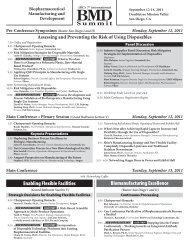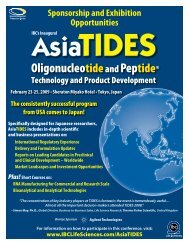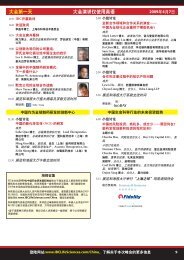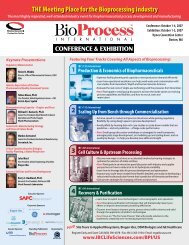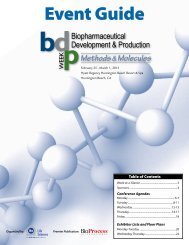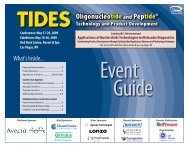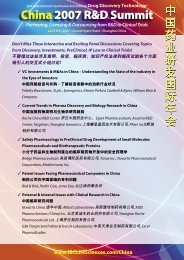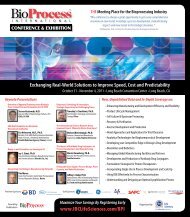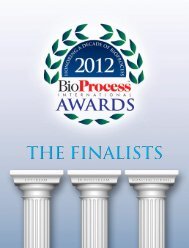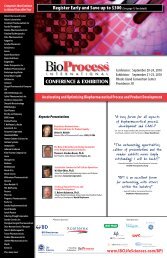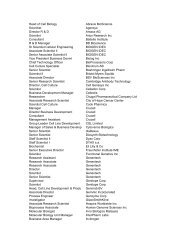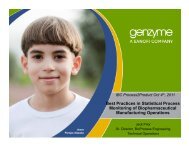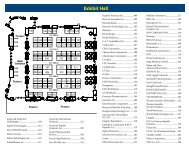Cell Culture & Upstream Processing - IBC Life Sciences
Cell Culture & Upstream Processing - IBC Life Sciences
Cell Culture & Upstream Processing - IBC Life Sciences
Create successful ePaper yourself
Turn your PDF publications into a flip-book with our unique Google optimized e-Paper software.
Thursday, September 25, 2008 • Main Conference<br />
7:00 Coffee<br />
7:15 Technology Workshop<br />
Technology Workshop still available. Please contact Kristen Schott at (508) 614-1239 or kschott@ibcusa.com for more information.<br />
1<br />
2<br />
Production & Economics of<br />
Biopharmaceuticals<br />
Scaling Up from Bench<br />
through Commercialization<br />
Choose from these Small Group<br />
Discussion Sessions and Workshops<br />
Sessions #1 and #2 will take place concurrently from<br />
8:00 am to 12:00 pm with a break at 9:45 am.<br />
Participation will be limited to 35 participants<br />
on a first come, first served basis.<br />
Workshop Discussion Session #1<br />
Lean Six Sigma in a Biotech<br />
Setting: Constraint or Enabler?<br />
Six Sigma is a well known program for compressing process<br />
variability and eliminating non-value adding work that has<br />
been applied in many business settings. Six Sigma has been<br />
applied with mixed success in the biotech industry. It has been<br />
suggested that Six Sigma is inappropriate for the biotech setting<br />
because it is a constraint upon creativity, hinders continuous<br />
improvement, and adds an administrative burden that slows<br />
speed to market endeavors. It has also been observed that, in<br />
a period where QBD and platform technologies are becoming<br />
more important to biotech, Six Sigma can provide a structure<br />
and shared vocabulary between business units and companies<br />
that aids innovation and speed to market. This workshop will<br />
explore both perspectives through facilitated discussion and<br />
examples of Six Sigma practices in the biotech industry.<br />
Note: This same discussion will be run two times in a row, first from 8:00<br />
am to 9:45, then again from 10:30 am to noon. Participation in each<br />
section will be limited to 35 participants on a first come, first served basis.<br />
Facilitators:<br />
Jeffrey C. Baker, Ph.D., Senior Research Advisor and Six<br />
Sigma Black Belt, Eli Lilly and Company<br />
Paul W. Allen, Vice President, Managing Partner,<br />
<strong>Life</strong> <strong>Sciences</strong>, Clarkston Consulting<br />
Discussion Session #2<br />
Standards for Disposables:<br />
What would End-Users Like to See?<br />
Disposable technology has made significant gains in popularity<br />
in recent years, based improvements in technology and on<br />
drivers such as convenience, flexibility, and capital deferral.<br />
However, there are user concerns over sourcing, disposal, and<br />
the proliferation of differing solutions to the same problems.<br />
Industry groups such as ISPE, PDA and BPSA have formed<br />
groups to address these concerns. In this workshop we will<br />
attempt to have a balanced discussion on the pros and cons<br />
of disposable technology and discuss where standards are<br />
required and what kind users would like to see.<br />
Moderator:<br />
Duncan Low, Ph.D., Scientific Executive Director, Process<br />
Development, Amgen Inc.<br />
Panelists:<br />
Adam Goldstein, M.S., Senior Manager, Oceanside Clinical<br />
Operations, Genentech, Inc.<br />
Miriam Monge, Vice President, BioPharm Services, U.K.<br />
Justin Hutchinson, Bioprocess Systems Product Manager,<br />
Thermo Fisher Scientific<br />
Andrew Sette, Director of Quality and Regulatory Affairs,<br />
Sartorius-Stedim Biotech, France<br />
Jason Slinchak, Manufacturing Engineer,<br />
Human Genome <strong>Sciences</strong>, Inc.<br />
<strong>Cell</strong> <strong>Culture</strong> &<br />
3 Recovery & Purification<br />
<strong>Upstream</strong> <strong>Processing</strong><br />
4<br />
Track Sponsor:<br />
8:00 Track Sponsor’s Introduction:<br />
Taking the Industry to the Next Level<br />
Thomas Isett, Vice President,<br />
BD Biosciences – Advanced Bioprocessing<br />
8:05 Chairperson’s Opening Remarks<br />
Dennis M. Kraichely, Ph.D., Principal Research<br />
Scientist, Expression Technologies, Centocor, Inc.<br />
Advances in <strong>Cell</strong> Line<br />
Development & Clone Selection<br />
8:15 Selecting GS-CHO <strong>Cell</strong> Lines for<br />
Antibody Manufacture<br />
After transfection, a sequential series of<br />
screens are typically used to select a ‘desirable’<br />
cell line for antibody manufacture from the<br />
heterogeneous population. <strong>Cell</strong> line behavior<br />
in such a strategy was studied and compared<br />
with subsequent behavior in bioreactor culture.<br />
Although highly productive cell lines can be<br />
selected, potential strategies for improving the<br />
‘hit rate’ of identifying ‘good’ manufacturing cell<br />
lines will be discussed.<br />
Alison Porter, Science Leader, <strong>Cell</strong> <strong>Culture</strong> Process<br />
Development, Lonza Biologics<br />
8:45 Manufacturability Assessments<br />
CASE<br />
for Early Stage Therapeutic<br />
STUDY<br />
Candidate Screenings Using<br />
Biophysical Characterization<br />
Transferring lead molecules from research into<br />
process development at a relatively fast pace<br />
requires a process of candidate selection that<br />
assesses not only if a candidate is active and<br />
safe, but also “manufacturable.” Biophysical<br />
characterization of lead candidates prior to<br />
reaching process development helps rank<br />
candidates for conformational and colloidal<br />
stability. This assessment is especially useful when<br />
binding affinity and bio-activity are comparable<br />
among the candidates. Case studies of antibodies<br />
assessed for manufacturability under process<br />
conditions will be presented.<br />
Ranjini Ramachander, Ph.D., Senior Scientist,<br />
Amgen Inc.<br />
8:00 Chairperson’s Opening Remarks<br />
Uwe Gottschalk, Ph.D., Vice President,<br />
Purification Technology, Sartorius Stedim<br />
Biotech, Germany<br />
Overcoming Challenges of<br />
Large Scale Protein Production<br />
– Present and Future<br />
8:15 Development of a Precipitation<br />
Alternative and Improvements for<br />
Protein A for Impurity Reduction<br />
in Clarified Broth Containing a<br />
Monoclonal Antibody<br />
Improvements in titer have resulted in a potential<br />
bottleneck in downstream purification, which<br />
may be addressed by reduction in the number<br />
of chromatography steps or optimization of the<br />
existing unit operations. This presentation will<br />
discuss the evaluation of potential precipitants to<br />
reduce the level of impurities in clarified broth<br />
prior to capture chromatography, as well as<br />
various strategies and wash solutions on the initial<br />
Protein A step to maximize its efficiency.<br />
Judy K. Glynn, Ph.D., Senior Principal Scientist,<br />
Global Biologics, Pfizer Inc<br />
8:45 Scale-up Evaluation of Selective<br />
Antibody Precipitation and<br />
Continuous Recovery with a<br />
Disc-Stack Centrifuge<br />
Methods for selective precipitation of monoclonal<br />
antibodies with production bioreactor titers<br />
greater than 2 g/L have been developed at<br />
Biogen Idec as an alternative to chromatography<br />
for enhanced throughput and purification of<br />
antibodies. To demonstrate the scale-up of this<br />
process, antibody was precipitated from 200 L<br />
batches of clarified cell culture media and fed to<br />
the same continuous disc-stack centrifuge used<br />
for cell harvesting. Antibody precipitate was<br />
successfully collected with high recoveries in<br />
the solids discharge vessel while antibody-free<br />
supenatant was sent to waste. In summary, this<br />
precipitation technology will be compared to<br />
traditional chromatographic capture methods.<br />
Philippe de Vilmorin, Engineer,<br />
Biopharmaceutical Development, Biogen Idec<br />
Group Discounts for Significant Savings!<br />
Delegates can enjoy significant savings on standard registration fees when registering<br />
for the BioProcess International Conference and Exhibition by sending teams to the<br />
event. <strong>IBC</strong> <strong>Life</strong> <strong>Sciences</strong> offers competitive discounted rates for companies sending<br />
groups of 3 or more. For more information, contact 646-895-7445.<br />
Visit www.<strong>IBC</strong><strong>Life</strong><strong>Sciences</strong>.com/BPI/US for up-to-date information on this event 11



